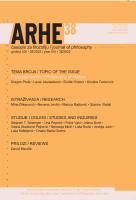„Mešani ustav“ i svetsko-istorijski režimi u Hegelovoj političkoj filozofiji
The “Mixed Constitution” and World-Historical Regimes in Hegel’s Political Philosophy
Author(s): Đorđe HristovSubject(s): History of Philosophy, Political Philosophy, German Idealism, Philosophy of History
Published by: Филозофски факултет, Универзитет у Новом Саду
Keywords: Mixed constitution; World history; Regime; Roman republic; Polybius; Hegel;
Summary/Abstract: In the article, I wish to show how Hegel’s political philosophy and in particular his understanding of the modern constitution from The Philosophy of Right rests on the chronology from his world history. This relationship, as I will also show, is based on his adoption of the Roman republican constitution as it was presented by the ancient Greek historian Polybius. In the first step, I will present Hegel’s appropriation of the Polybian “mixed constitution” and how Hegel integrates world-historical regimes into his political philosophy through this model. Afterwards I will point out some important differences between the ancient, republican, and the modern, monarchic constitution. These differences arise out of the relationship of work and war with politics and Hegel’s attempt to “postpone” the downfall of the modern state’s sovereignty. Finally and following from this, I will turn to the ambivalences of the meaning of “end of history” in Hegel’s philosophy.
Journal: Arhe
- Issue Year: 2022
- Issue No: 38
- Page Range: 71-90
- Page Count: 20
- Language: Serbian

